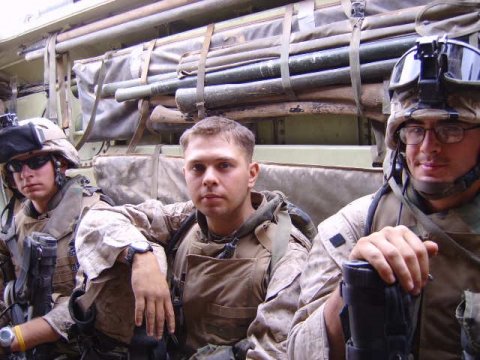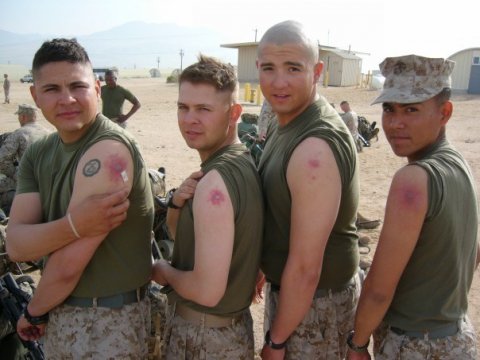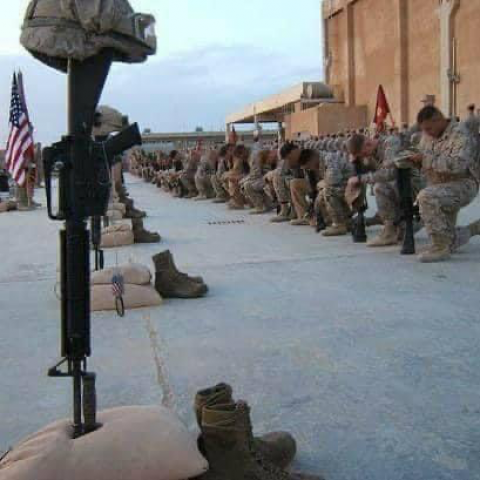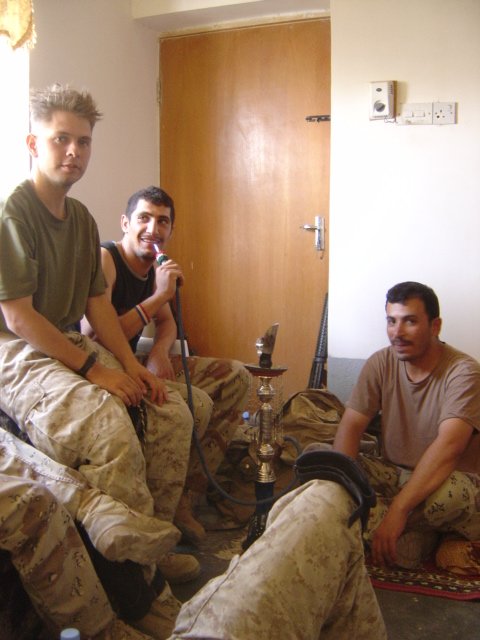When protesters began breaking into the U.S. Capitol building during the January 6 riot, Representative Ruben Gallego, a former Marine, instinctively jumped on a desk to give his colleagues advice on how to put on their gas masks and regulate their breathing.
In those chaotic moments, he admits now, he wished he had his military-issued gun.
"I wanted my weapon, I wanted my Marines around me at that point," he told Newsweek.
In stories about the politically-fueled insurrection at the time, Gallego was said to have performed heroically, staying calm and helping his frightened colleagues get to safety as rioters poured into the Capitol.
But in his new memoir "They Called Us 'Lucky': The Life and Afterlife of the Iraq War's Hardest Hit Unit" out on November 9, Gallego goes back in time, detailing how a poor Latino student enrolled at Harvard ended up as an infantryman assigned to Lima Company, 3rd Battalion, 25th Marine Regiment, in the sands of Iraq.

Gallego was on the ground in March 2005 at the height of the insurgency. His memoir was co-written with Jim DeFelice, whose book "American Sniper" was adapted into an Oscar-winning movie by Clint Eastwood. They write that Lima Company and its approximately 185 Marines were initially called "Lucky Lima" for their lack of casualties in its first couple months.
But that luck would soon run out.
Lima Company eventually lost 22 Marines and a Navy corpsman killed in action in less than six months. Gallego's battalion ultimately lost 48 men, the most casualties of any Marine unit since the Beirut bombing in 1983.
Gallego lost many young men he fought with and knew well, but was devastated when his best friend Lance Corporal Jonathan W. Grant was killed by an IED explosion in May 2005.
The loss of his good-natured friend who helped get him in shape for the Marines and shared snacks with him on dangerous treks through Iraq felt like "something got ripped out of my body," he writes. He also notes that by his count he could have died 11 different times during his combat tour, moments that were avoided by sheer luck that kept him from being in the wrong place at the right time.
"I haven't made peace with it," Gallego told Newsweek in an interview about his book of making it home when others didn't. "Making peace with it means having to accept some things I don't want to accept. I don't want to accept there is such randomness in the world that it can kill married men with kids versus single men. I don't want to come to conclusions that something else determines people's value in the world. Dealing with survival everyday is a struggle, but you have to move forward with that."

A theme of the book is dispelling taboos and misconceptions around post-traumatic stress disorder (PTSD). Gallego's initial pitch for the book was the story of his friend Sergeant Jonithan McKenzie, who struggled mightily after returning home, and called Gallego upset two years after their tour because the Veterans Affairs (VA) hospital was requiring evidence that McKenzie was in combat before it would provide him with mental health services.
McKenzie would go on to turn his life around, which to this day makes Gallego beam with pride. But the former Marine who is now a U.S. congressman also explains in the book how PTSD was simmering under the surface in his own life, like a dull, ever-present ache, until he was diagnosed and received counseling.
"You can be successful and happy and still have it there," Gallego says now of PTSD. "It also doesn't make you a weaker person to go through it."
In one of the most striking passages in the book, Gallego describes the events that happened during Operation Matador in May 2005, when more than a dozen members of his platoon were killed or injured in dangerous house-to-house fighting. Many casualties were incurred in what became known as Hell House, a heavily fortified building where terrorists ambushed Marines from within the walls.

Gallego goes into excruciating detail on the events of that day, including his pain over not being with his fallen friends because he had other orders blocks away. He describes his brothers-in-arms as "heroes," but himself as a "middling, mediocre" Marine who did the task at hand.
Asked why he included that description in the portion of the book that is most like a big-budget Hollywood war movie, Gallego said it was because he wanted to make the war real to people.
"What happens in these war stories is people glorify the war and they don't tell you the f***ed-up things that happen," he said. "These are real people, these are young men. [Private First Class Christopher R. Dixon,] one of the guys that died, was only 18 or 19 going into Hell House a couple times knowing there were men down and terrorists everywhere. These guys are heroes, but they're also human beings."
Gallego closes the book with a description of his vantage point and experiences on January 6. By this time, the reader knows that Gallego is trained for anything that could come at him in that moment. But that knowledge comes with the realization that he had to use his combat training in his job at the U.S. Capitol as an American congressman.
Gallego's memories are shocking, but they reveal the severity of the incursion that day. He told Newsweek that he had some of the younger members of congress with him as they sought safety for themselves and some of his older colleagues.
One of his primary thoughts was that if they were attacked by rioters the younger members would have to work together to take them down. As Gallego walked with Representative Colin Allred, a 6-foot-1 former linebacker for the Tennessee Titans, they agreed that Allred would tackle the first person to come at them and Gallego would take on the second person. His only weapon, as he says in the book, was a pen.
But one of Gallego's enduring memories is of encountering a security supervisor as members of Congress were being ushered to safety who was telling two young Capitol police officers, "Anyone comes down this hall, you shoot them." Looking at the young men, he recalled his time in combat, and wondered if they would be willing to shoot if they had to.
He writes that he considered asking them if they wanted to trade places before leaving to meet up with colleagues in the safe room.

Gallego closes the book by saying he remains optimistic despite it all, because he views the attack as "the last gasp of a dying attitude and impulse of hate and division." Even though many Republicans still maintain that the election was stolen, and former President Trump recently said Republicans won't vote in next year's midterms unless 2020 election fraud is prioritized by his party, Gallego still sees it as an end rather than a beginning.
"I get that it looks dark, and I think there's going to be a lot more hiccups along the way, whether that means violence or elections," he told Newsweek. "But the country has gone through a lot in the past and has healed itself and moved on."
While a large number of Republicans may believe the election was stolen, he said, it still only represents one-third of the country.
"What we see on TV is that it's an evenly split country," he added, "when one-third are vociferous and loud."
Another theme of the the book is that his group of Marines were a diverse bunch from all around the country. Now he says while most of them are Republicans, on January 6 he was getting texts from his buddies saying what they were watching on TV "wasn't right," acknowledging that they were Trump supporters but they "would never" take the violent approach.
Gallego closed the interview by addressing a Newsweek report that a "Run Ruben Run" fundraising effort was created by Nuestro PAC to draft him to primary Senator Kyrsten Sinema due to the immense frustration from progressives and Democrats over her opposition to broad elements of President Biden's legislative agenda, including a social spending and climate reconciliation bill that hangs in the balance.
Gallego laughed when asked about primarying Sinema, before becoming serious.
"I've been telling people from Day One the focus is on getting this goddamn reconciliation bill passed and then making sure we keep the House in 2022," he said. "The most important thing we can do is make sure it passes, and Sinema needs to understand we are all one team and have to do this together. As far as what happens in the future, it's too soon to say anything, but right now we need Sinema on board."








